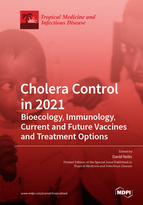Cholera Control in 2021: Bioecology, Immunology, Current and Future Vaccines and Treatment Options
A special issue of Tropical Medicine and Infectious Disease (ISSN 2414-6366). This special issue belongs to the section "Infectious Diseases".
Deadline for manuscript submissions: closed (31 August 2021) | Viewed by 55863
Special Issue Editor
Interests: vaccine development; vaccinology; immunology of infectious diseases; intestinal infectious and pathophysiology; cholera; hepatitis; malaria
Special Issues, Collections and Topics in MDPI journals
Special Issue Information
Dear Colleagues:
Cholera continues to be a global threat in the 21st century, chiefly due to the continued lack of adequate resource provision and political will to ensure safe potable water supply and sanitary waste disposal for a burgeoning global population. The current Special Issue on cholera provides an overview of the available control measures from the perspectives of bioecology, immunology and vaccinology and treatment. These modalities have the potential to reduce cholera case fatality rates to less than 1% if properly implemented. In this Special Issue on cholera, the current state of the art of science-based control measures is reported on by several of the world’s leaders in the research on the control of cholera and allied acute watery diarrheal diseases.
Dr. Rita Colwell, Dr. Anwar Huq and colleagues at the University of Maryland and the University of Florida will review the latest information on environmental factors for the prediction and prevention of cholera. Dr. Jacqueline Dean and Dr. John Clemens will contribute an overview of recent insights into the performance of licensed and recommended cholera vaccines. Dr. Jan Holmgren will present an update on cholera immunity and the next generation of cholera vaccines. Dr. David Nalin will discuss cholera treatment options and optimums for the 21st century, and Dr. Richard A. Cash will focus on bringing diarrhea treatment, control, and prevention to the community.
You may choose our Joint Special Issue in Life.
Prof. Dr. David Nalin
Guest Editor
Manuscript Submission Information
Manuscripts should be submitted online at www.mdpi.com by registering and logging in to this website. Once you are registered, click here to go to the submission form. Manuscripts can be submitted until the deadline. All submissions that pass pre-check are peer-reviewed. Accepted papers will be published continuously in the journal (as soon as accepted) and will be listed together on the special issue website. Research articles, review articles as well as short communications are invited. For planned papers, a title and short abstract (about 100 words) can be sent to the Editorial Office for announcement on this website.
Submitted manuscripts should not have been published previously, nor be under consideration for publication elsewhere (except conference proceedings papers). All manuscripts are thoroughly refereed through a single-blind peer-review process. A guide for authors and other relevant information for submission of manuscripts is available on the Instructions for Authors page. Tropical Medicine and Infectious Disease is an international peer-reviewed open access monthly journal published by MDPI.
Please visit the Instructions for Authors page before submitting a manuscript. The Article Processing Charge (APC) for publication in this open access journal is 2700 CHF (Swiss Francs). Submitted papers should be well formatted and use good English. Authors may use MDPI's English editing service prior to publication or during author revisions.
Keywords
- cholera
- control
- immunology
- vaccines
- treatment







